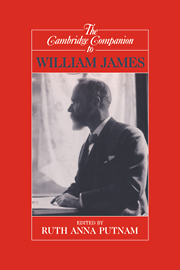Book contents
- Frontmatter
- Introduction
- 1 Pragmatism and introspective psychology
- 2 Consciousness as a pragmatist views it
- 3 John Dewey's naturalization of William James
- 4 James, Clifford, and the scientific conscience
- 5 Religious faith, intellectual responsibility, and romance
- 6 The breathtaking intimacy of the material world
- 7 James, aboutness, and his British critics
- 8 Logical principles and philosophical attitudes
- 9 James's theory of truth
- 10 The James/Royce dispute and the development of Jarnests "solution"
- 11 William James on religious experience
- 12 Interpreting the universe after a social analogy
- 13 Moral philosophy and the development of morality
- 14 Some of life's ideals
- 15 “A shelter of the mind”
- 16 The influence of William James on American culture
- 17 Pragmatism, politics, and the corridor
- 18 James and the Kantian tradition
- Bibliography
- Index
14 - Some of life's ideals
Published online by Cambridge University Press: 28 May 2006
- Frontmatter
- Introduction
- 1 Pragmatism and introspective psychology
- 2 Consciousness as a pragmatist views it
- 3 John Dewey's naturalization of William James
- 4 James, Clifford, and the scientific conscience
- 5 Religious faith, intellectual responsibility, and romance
- 6 The breathtaking intimacy of the material world
- 7 James, aboutness, and his British critics
- 8 Logical principles and philosophical attitudes
- 9 James's theory of truth
- 10 The James/Royce dispute and the development of Jarnests "solution"
- 11 William James on religious experience
- 12 Interpreting the universe after a social analogy
- 13 Moral philosophy and the development of morality
- 14 Some of life's ideals
- 15 “A shelter of the mind”
- 16 The influence of William James on American culture
- 17 Pragmatism, politics, and the corridor
- 18 James and the Kantian tradition
- Bibliography
- Index
Summary
In the preface to The Will to Believe James described his “philosophical attitude” as a “radical empiricism,” empiricism because he regarded all claims concerning matters of fact as hypotheses subject to revision in the light of subsequent experience, and radical because he extended this empirical attitude to metaphysical hypotheses. Specifically, “unlike so much of the halfway empiricism that is current under the name of positivism or agnosticism or scientific naturalism, it does not dogmatically affirm monism as something with which all experience has got to square. The difference between monism and pluralism is perhaps the most pregnant of all the differences in philosophy” (WB, 5; emphasis added). Although he uses the expression “radical empiricism,” this view is not yet the doctrine that he later advocated as radical empiricism.' Yet he was already a pluralist in more than one sense.
In this essay I am interested in the kind of pluralism that James intended to foster in “On a Certain Blindness in Human Beings” and “What Makes a Life Significant,” but not only in those essays. He characterized this pluralism in the preface to Talks to Teachers as follows. “The truth is too great for any one actual mind, even though that mind be dubbed 'the Absolute,' to know the whole of it. The facts and worths of life need many cognizers to take them in. There is no point of view absolutely public and universal. Private and incommunicable perceptions always remain over, and the worst of it is that those who look for them never know where” (TT,4; emphasis in the original).
- Type
- Chapter
- Information
- The Cambridge Companion to William James , pp. 282 - 299Publisher: Cambridge University PressPrint publication year: 1997
- 3
- Cited by

